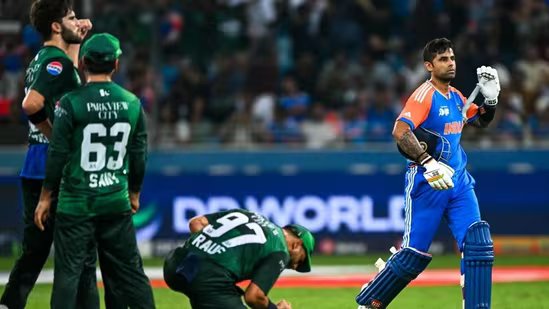Tensions Rise Over Future India-Pakistan Cricket Matches Following Asia Cup Fallout
The recent Asia Cup 2025 has reignited discussions about the frequency of cricket matches between India and Pakistan, with some voices calling for a reduction in encounters between the two cricketing giants. This comes in the wake of heightened tensions during the tournament, which saw India and Pakistan face off three times, with India emerging victorious on each occasion. However, the matches were marred by controversy, leading to a BCCI official’s dismissal of calls for fewer games as overly simplistic.
A Tournament Marked by Tension
The Asia Cup 2025 was not just another cricket tournament; it was a stage for long-standing rivalries and national sentiments. The backdrop of the matches included the recent Pahalgam terror attack and Operation Sindoor, which added a layer of emotional intensity to the encounters. The group stage match on September 14 was particularly notable, as Indian players, led by Suryakumar Yadav, refused to shake hands with their Pakistani counterparts, signaling a clear divide.
The Super 4s match on September 21 further escalated tensions, with Pakistani players reportedly making provocative gestures. This atmosphere of animosity has led to calls from various quarters, including former England captain Michael Atherton, for the International Cricket Council (ICC) to reconsider the scheduling of matches between these two nations. Atherton emphasized that the current climate is not conducive to such high-stakes encounters.
BCCI’s Response to Calls for Fewer Matches
In response to these suggestions, a BCCI official spoke to Dainik Jagran, emphasizing the complexities involved in making such decisions. “It’s easy to talk about all this, but will sponsors and broadcasters agree to it?” the official stated. This highlights a crucial aspect of modern sports: the financial implications of scheduling decisions. The official pointed out that if any major team, not just India, were to withdraw from a tournament, it could deter sponsors and broadcasters, making it difficult to attract financial backing.
The BCCI’s stance reflects a broader reality in international sports, where financial considerations often take precedence over sporting rivalries. The official’s comments underscore the intricate web of relationships between cricket boards, sponsors, and broadcasters, which complicates the decision-making process.
The Trophy Controversy
Adding to the drama, India has yet to receive the Asia Cup trophy from the Pakistan Cricket Board (PCB). Following their refusal to accept the silverware from PCB Chairman Mohsin Naqvi, the trophy remains at the Asian Cricket Council (ACC) headquarters in Dubai. Naqvi has publicly stated that if India wants the trophy, Suryakumar Yadav must come to Dubai to collect it personally. This situation has led to speculation about the future of the trophy and the ongoing tensions between the two cricketing nations.
A recent ACC meeting reportedly saw heated exchanges between Naqvi and BCCI representatives Rajeev Shukla and Ashish Shelar. However, Naqvi has not provided a clear timeline for when the trophy will be handed over, further complicating the already fraught relationship between the two boards.
Historical Context of India-Pakistan Cricket Rivalry
The rivalry between India and Pakistan in cricket is one of the most intense in the sport’s history. It dates back to their first encounter in 1952 and has been characterized by not just competitive spirit but also political tensions. Matches between the two nations often draw massive viewership, making them some of the most-watched events in cricket history.
Historically, the cricketing ties between India and Pakistan have been influenced by broader geopolitical issues, including wars and diplomatic relations. The matches serve as a microcosm of the larger relationship between the two countries, often reflecting the prevailing sentiments of their respective populations.
The Future of India-Pakistan Matches
As discussions about the future of India-Pakistan matches continue, the BCCI’s position suggests that the board is not ready to make any drastic changes. The financial implications of reducing matches could have far-reaching consequences, not just for the boards involved but also for the sport as a whole.
The cricketing world is watching closely as the situation unfolds. The ICC may need to step in to mediate and find a solution that balances the competitive spirit of the game with the realities of the current geopolitical climate.
Conclusion
The fallout from the Asia Cup 2025 has opened a Pandora’s box of discussions regarding the future of cricket matches between India and Pakistan. While calls for fewer encounters may resonate with some, the complexities of sponsorship, broadcasting, and historical rivalries make such decisions far from straightforward. As both nations navigate this intricate landscape, the cricketing community remains hopeful for a resolution that honors the spirit of the game while acknowledging the realities of the world beyond the pitch.











